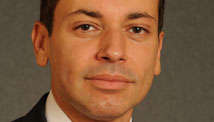
- Khairi Abaza says dictator Ben Ali's fall brought chaos and uncertainty for Tunisians
- He says military helping keep order, but will it lead to "soft" dictatorship, not democracy?
- He says army seemed to side with the people in Ben Ali ouster; should it be seen as patriotic?
- Abaza: The West must stand with Tunisian people as they reach for democracy
Editor's note: Khairi Abaza is a senior fellow at the Foundation for Defense of Democracies, a non-partisan policy institute that aims to promote democracy.
(CNN) -- The fear and chaos that follows the fall of the Tunisian dictator Zine El Abedine Ben Ali on January 14 raises uncertainty about the country's future. Already, it can be said that Tunisia will never be the same.
The best-case scenario is a move toward a liberal democracy. The worst case is a perpetual state of chaos, followed by another autocratic or even theocratic regime. Whatever the final result, it is clear that the Tunisian army will have a significant role in shaping the future of this North African state.
The Tunisian army, more than any other institution, is helping the country overcome its current state of chaos. When it finally succeeds (chaos cannot endure for too long before exhaustion sets in), an important question looms: What role will the army play in the shaping of the new political order?
Will it genuinely support a liberal democratic order? Or will it help establish a "softer" style autocratic rule -- what we might call "dictator light" -- that will ultimately renew the familiar cycle of Arab autocracy that is a façade of stability, propped up by the West as a counterweight to the threat of an Islamist regime?
An underreported story from Tunisia is that the military actually played a role in the unrest that began in December. Of course, the military did not provoke it (it was an organic uprising), but it adopted policies that contributed in small ways to the Jasmine Revolution's success.
For one, the army refused to use live bullets against the demonstrators. It was for this reason that Ben Ali fired his army chief, Gen. Rachid Ben Ammar, shortly before fleeing the capital, Tunis. Tunisians have acknowledged this patriotic decision; the army sided with the people.
Second, when militias presumably loyal to Ben Ali started to destabilize the country, the army mobilized to protect the population. Indeed, shortly after the appearance of the militias in the streets of Tunisia, the army created emergency hot lines for citizens to call for the army's help. While the military could not be everywhere at once, Tunisians say it was responsive in most instances.
Today, the army is keeping a modicum of order in Tunis and other parts of the country, despite lootings and scenes of chaos. The military also launched an assault on the presidential palace, where forces loyal to Ben Ali are seeking refuge. Thus, it appears the military seeks to bring an end to the Ben Ali era while restoring order to the capital. Indeed, Tunis sets the tone for the rest of the country.
In addition to the militias, the army is arresting some of the more unpopular figures from the Ben Ali regime, including the former head of security and some relatives of Ben Ali's wife, who are accused of corruption.
While the military has acted laudably on the streets of Tunisia in recent days, the West must ensure that the new regime that emerges in Tunis is one in which the military does not play a significant part.
The scene is reminiscent of the 1991 "palace coup" in Algeria. After significant Islamist electoral gains, the army played a role in bringing to power a respected exiled dissident, Mohamed Boudiaf, to lead the country and serve as a popular and respected façade for a military regime. Boudiaf was assassinated shortly after he took office, presumably for promising reform and an end of the military domination of politics.
Afterward, Algeria lapsed into authoritarianism. Two decades later, corruption, unemployment and political frustration are still rife. The regime lacks accountability and transparency.
In Tunisia today, the continued prominence of the military puts the country at risk of a "soft" palace coup that might rip the fruit of this revolution and gradually slide the country into a more "liberal" authoritarian rule.
To best support the Tunisian people and protect Western interests in a durable way, the West should stand firm with the Tunisian people and ensure that the country moves toward a liberal democracy.
Only a real democracy can ensure that the people of Tunisia will be satisfied with the results of their uprising, and only then can the West ensure that theocrats or autocrats do not wrest control of the country.
The opinions expressed in this commentary are solely those of Khairi Abaza.
No comments:
Post a Comment